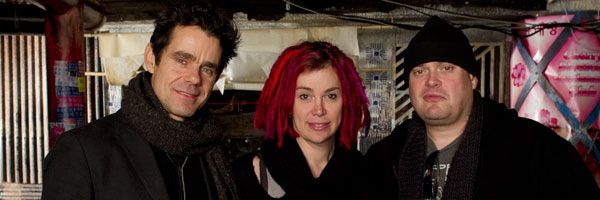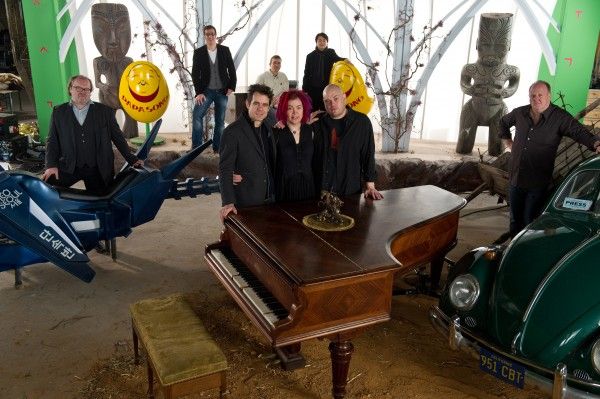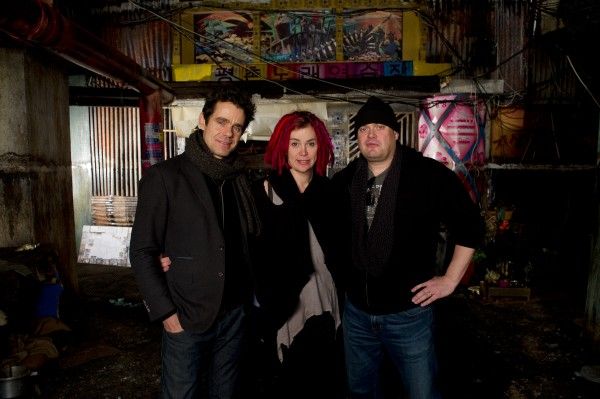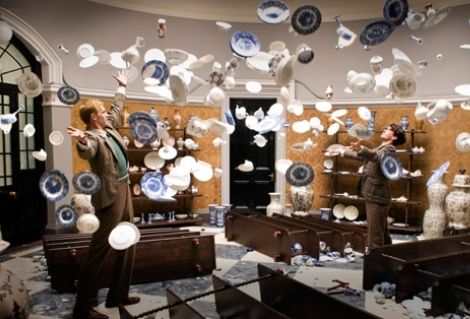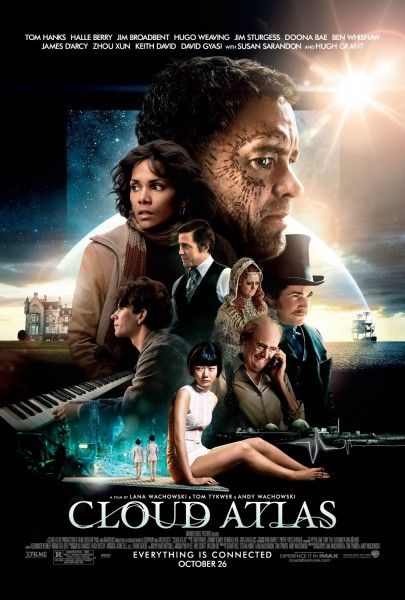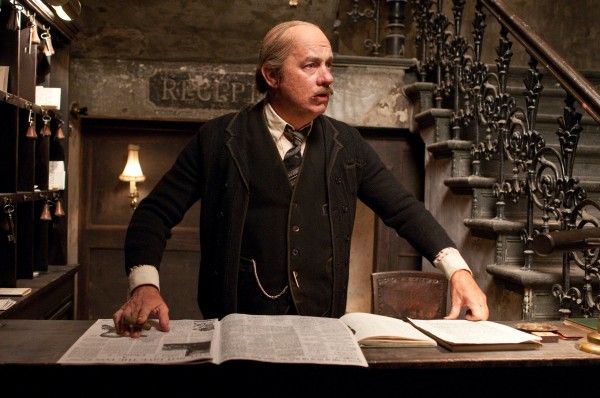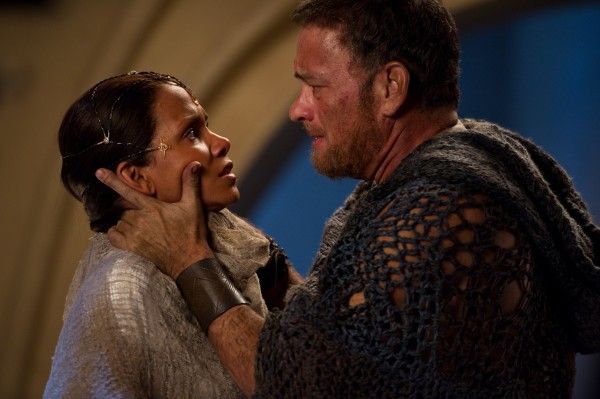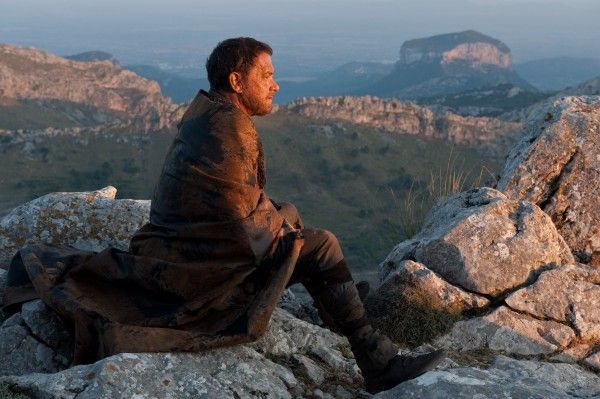From acclaimed filmmakers Andy & Lana Wachowski (The Matrix trilogy, Speed Racer) and Tom Tykwer (Run Lola Run) comes the stunning, epic and powerful Cloud Atlas, based on the best-selling novel by David Mitchell. Through various genres and time periods, spanning 500 years, and with the actors playing a variety of characters that cross genders and races, the story contains drama, mystery, action and love, interwoven in such a way that illustrates how everything is connected and that the actions and choices in one era can have consequences in another. The film stars Tom Hanks, Halle Berry, Susan Sarandon, Hugh Grant, Jim Broadbent, Hugo Weaving, Jim Sturgess, Ben Wishaw and James D’Arcy.
At the film’s press day, the previously press-shy Wachowskis and German filmmaker Tom Tykwer, who also composed the music, talked about what made them want to engage in discussions of this film, striving for a boldness in their storytelling, having breakthroughs about how to adapt the story for film, and collaborating as a group. Tykwer also talked about what it was like to compose The Cloud Atlas Sextet, while the Wachowskis said that they’re not thinking about Jupiter Ascending yet, but that they like their material to be reflective of where they are, at that point in their lives. Check out what they had to say after the jump.
Question: Lana and Andy, why have you been so reclusive in the past, and what’s brought you out for Cloud Atlas?
LANA WACHOWSKI: Well, first, we want to say that I hope you didn’t take it personally that we didn’t do press. We didn’t mean it as a rejection of this process or a rejection of the people in this process. We feel that anonymity allows you a way to participate in the world, particularly in civic space. Once you lose your anonymity, that door and that access to that way of being is denied to you, and we didn’t want to give that up. We love that aspect of our lives and our humanity, and we didn’t want to lose it. In the end, we met this beautiful human being (Tom Tykwer). Just like in the movie, encountering someone can change your life, and we encountered him. He does engage in this process and he told us, “Don’t be afraid.” He engages in it in a very authentic and very inspiring way. At the same time, the movie itself is about engagement with the world. If you want to imagine a better world, the only way to achieve that better world is a process of engagement. We wanted to help participate in the imagining of another world, so here we are, engaged.
Do you feel pressure to challenge the very style of filmmaking, each time out?
LANA: It doesn’t come from a negative impulse, like we’re rejecting this conventional form.
But, is there a certain boldness of storytelling that you strive for?
ANDY WACHOWSKI: Well, we don’t want to make the same movie, over and over. We want to be challenged and find something to do that’s new and different. This movie, in particular, was an opportunity to do something, and to talk about breaking down convention. It was the idea of working with another director who we admire so much, and had a love affair with his movies and the man, himself. And it was the idea of bringing our two crews together who, in a way, are extensions of us. We all got into a sandbox and played together, which was life-altering to us. When those opportunities present themselves to you, you have to jump at them.
TOM TYKWER: If you enter the process of making a film, whatever it is, it is a quite exhausting and very intensive process. Making movies that are like many, many other movies, I don’t think we would do it. There’s people who really love the sheer craft on it, which I do respect because I think it is a craft, but if I don’t have this extra bit of an idea that it might be something unlike anything else I’ve done before or maybe even seen before, then I have a motivational problem. To abandon any kind of private life, and to live these years and years of intensity that’s so tunnel-focused to keep it alive, is really challenging.
LANA: It would seem a logical conclusion that you would find, in all of our work, a resistance to convention, inside the thematic elementary particles of the stories and the themes. There is a repeating motif of the transcendental power of love, and that love allows you to transcend certain things. There are conventional power structures that you must attempt to transcend. This theme being repeated in the work, and that the work actually representing the theme, doesn’t seem like a narrative leap.
Could there still be an intimate Bound type story in the framework that you’re talking about?
LANA: Another huge traditional convention is that, when women took on a male patriarchy, they were always doomed to lose. I think Bound was the first film, in history, that suggested that two gay women could take on a male patriarchal structure.
ANDY: And have a happy ending.
LANA: And go off and live, happily ever after. At the same time that movie was coming out, Thelma and Louise was coming out, and Thelma and Louise actually suggests the traditional understanding of the paradigm, which is if two women took on the male patriarchy, then your only hope is to just kill yourself.
ANDY: By driving off a cliff.
LANA: That was heralded as like a feminist film, go figure that.
Did you ever talk about that with Susan Sarandon?
LANA: Of course! The day we met her.
What was her reaction to your analysis?
LANA: She liked Bound better, too.
Did you have a brainstorm moment about how to adapt this book into a movie?
ANDY: I’m still having breakthroughs, and the movie’s done. There are still moments in the film that are revealing themselves to me. There is an organic thing, in the DNA of the movie, that is constantly reflecting. It’s like a hall of mirrors, in a way. So, when you pull apart the fiber of the book and the genetic structure into these molecules, and you lay the stories out, you’re constantly having breakthroughs because the book is so brilliant, in that way. The structure of the book is a palindrome, so the first story is also the last story, and the center story is the top of the pyramid. The way that David Mitchell wrote it, it’s like you can feel how each of these little things connect and you’re constantly noticing the similarities between them.
TYKWER: If you read the book, and then think about it and memorize it, it’s different than the process of reading it because somehow, in remembering it, all the stories merge. They become one tale. Once we had discussed and analyzed this experience, we said, “So the movie should reach out to this experience.” Actually, we said, “Let’s make a movie that represents the experience, post read, where this is one unified tale.” We knew that we would have to find a different structural approach, cinematically, as opposed to the book, because you wouldn’t really want to start over, again and again, every 13 minutes, and then, after two hours, open up a new book of new characters and stuff.
LANA: Yeah. The goal of David Mitchell splicing the six stories together is to make you, as a reader, start thinking about the ways that the stories are interconnected. They’re reflecting and they’re resonant, the structures are the same, and the characters and challenges are the same, so the goal that he had was the same as our goal. He wanted to dissolve the barriers between these genres and tones and time periods, and suggest this larger work, this larger idea, this larger humanity, and this understanding of humanity. In the same way, that was our goal with the film. That interweaving way that we did it represents the way that the book ultimately works on your brain.
Andy and Lana, what was it like to work with another director and collaborate as a group of directors? How did that change your process?
ANDY: Well, our filmmaking process is unique because there’s the two of us. A typical dynamic is that there’s the director monologue, and the crew and actors can maybe access that monologue. You would expect them to be able to access it 100% of the time, but maybe they’re not even able to do that. With the two of us, the monologue become a dialogue because all of that monologue is externalized. A crew member can come and participate in it because they can hear the reasoning behind a series of decisions. We’re natural collaborators. The way we write and the way we participate, we embrace the social aspect of filmmaking. It’s a social art form. It’s a conscious act that we don’t take “A film by” credit because we’re aware that the whole crew is the collective that makes the movie. Ideologically, Tom is simpatico with that. The way that he’s made his movies with the same people, over and over again, because he goes into the process in an act of love, he’s extraordinarily collaborative, as a director.
LANA: The dialogue became a harmony.
Tom, how did it affect you?
TYKWER: It was many, many times a more natural transition than you might, or even I might, have imagined. I don’t know. There was an instinctive thing about it. We met and fell in love, and we enjoyed, so much, talking about the art and movies. It was so wonderful to be with directors who also know about the details of the profession and all the complexities that come along with it and, at the same time, have a similar vision. So, it seemed like a natural conclusion to say, “Let’s do something together,” partly because it was so hard to spend time together. If you become friends with a director, it’s a really bad idea because we’re always in our bubble. We usually end up having most of our friends from our crew because it’s the easiest way to even keep a relationship going. So, we ended up saying, “Okay, let’s do something together.” We were quite convinced it would work, but we still knew we had to find out. We felt that the easiest way to test it was to sit down and say, “Let’s write it.” We felt like, if we could write a screenplay together and start developing it together, because that’s the most intimate process, it would become so social and so much involving other people that it’s just an extension of something very nice. But, the moment we realized we were really contributing to the process, I felt like I was enhancing the limitations of me, by joining the group and creating this group directing and writing process. It was overwhelmingly fulfilling and satisfying.
How did you approach writing a piece of music that was supposed to be someone’s life’s work?
TYKWER: It was challenging. Of course, it was exciting because it was a character itself. Music became a character for the movie. The more we were working on it, the more it was clear that there was an operatic structure involved with and connected to the film. There was an operatic module that would help connect the dots of it. The individual challenge and beauty of it was that, treating the music as a character with several incarnations and reincarnations, would again help and support the togetherness of all the elements that the movie’s constructed of. If you take the sextet, Frobisher composes a thing in the ‘30s that hardly survives, but does survive in a few record shops with a few vinyls, so we can revisit it. What we heard in the ‘30s, we can find again in the ‘70s when Luisa Rey discovers the record in this record shop, being sold by the actor who played the composer, which is so fun. And then, it somehow still survives, but not as what it initially was, as elevator music that you might not even realize is being played in the elderly home. The piano music there is actually the sextet again. The jazz band is playing the sextet, at the party where Dermot Hoggins throws the critic over the railing. Then finally, in the future, it’s the death requiem when they think they’re going to heaven, but they’re actually walking towards their execution. It closes the circle of the requiem that Frobisher was actually writing for himself, on his way to his suicide, and stays connected to death and despair, as it ends in the mouths of those clones.
Andy and Lana, will Jupiter Ascending require you to create any new technology, like The Matrix and Speed Racer did?
LANA: We’re not there yet. We’re not on that planet yet.
Do you have any ideas that are not special effects or sci-fi driven?
LANA: We take them one at a time because, as you evolve and grow, you’re looking for material that is reflective of where you are, at that point in your life.
Cloud Atlas opens in theaters on October 26th.

